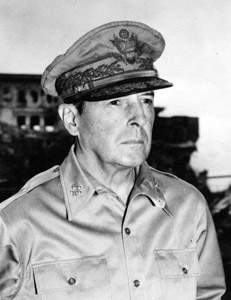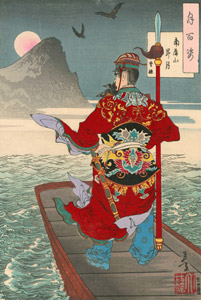企業戦略 2021.02.05
CS19 「マッカーサー参謀」”MacArthur’s General Staff”
目次
For those who prefer to read this column in English, the Japanese text is followed by a British English translation, so please scroll down to the bottom of the Japanese text.
戦国時代の智将、信州上田の城主、真田昌幸が領した尾瀬、「特に水鳥の生息地として国際的に重要な湿地に関する条約」(ラムサール条約)が指定する湿地となったのは、2005年11月8日であった。
高山植物の研究を行い、尾瀬の保護に努め、初代日本山岳協会会長となった人物が、武田久吉博士である。1910年英国に渡り、ロンドン大学、王立理工科大学で植物学を修めたが、その際に渡航を援助したのが、実父の英国人アーネスト・サトウ(Sir Ernest Satow)であった。
アーネスト・サトウは、駐日英国公使館の通訳として、1862年に来日した。後に駐日英国公使となり、通算25年に渡って日本に滞在、明治維新について記した回想録、「一外交官の見た明治維新」の著者としても名高い。
また、昨年、2020年7月11日、本コラムに投稿した「CS12 ー 英国で始まった「薩長同盟」The Satsuma-Choshu alliance began in England」に詳しく記したが、「薩長同盟」締結の背後で大きな力として、書道にも優れ、幕府高官や西郷隆盛、伊藤博文等の薩長の指導者へ、巧みな候文を送って親交を結び、明治維新成立の大きな力となった。
こうして、入手した多くの高精度の情報を英国に送った。これらの情報が英本国の日本分析、評価、方針決定にどれほど寄与したか想像に難くない。
1.大本営の「情報」
主人公、ジェームズ・ボンドの活躍で有名な「007シリーズ」は、原作者イアン・フレミングが、「英国海軍情報部」(The Naval Intelligence Division (NID)」に自らが勤務していた時の経験をもとに著したものである。このNIDは、1912年に設立されたものであるが、その淵源は世界各国に植民地を有した、遥か、16世紀後半のエリザベス一世の時代にまで遡る。「大英帝国」の隆盛は情報を重要視する国家政策が支えていたのである。
「情報」の英訳は通常「information」が使用されるが、NIDはその名称に「intelligence」を使っている。日本語で「情報」と言われるものは、実は大半が第一次資料である事実、観察等のdataである。このdataは他のdataと比較、検証して、第二次資料であるinformationにしなければならない。そして、更に、分析、評価のうえ判断を加えたintelligenceにして、初めてある目的のために使用でき得るものである。
日本占領後、米軍は日本軍を詳細に調査した結果を、「日本陸海軍の情報部について」と題した調査書に纏めたが、そこには「日本では、陸軍大学校や航空将校養成学校にも、情報学級もなければ特殊な情報課程もなく、わずかに情報訓練が行われたこともあったが、それも戦術や戦史、通信課程の付随的なものにすぎなかった」と日本軍における情報教育の皆無振りを記している。
これが、データよりも「自分の願望」を重視した作戦を横行させ、戦果についても「大本営発表」が常態化した背景である。
大本営陸軍部の情報参謀であった堀栄三少佐は、精神論を重視して、正確な情報の収集と分析を軽視する大本営にあって、米軍の上陸作戦行動を科学的に分析、「敵軍戦法早わかり」を作成した。前線部隊に知らせるため、1944年10月九州鹿屋の海軍飛行場にいた時、折しも行われていた台湾沖航空戦の報を聞き、「戦果を確認せず米機動部隊の全艦艇数十隻を撃沈したと思い込んでいる」と懸念、大本営に緊急電報を打ったが握りつぶされた。

事実、撃沈された米艦船は一隻も無く、更にこの大誤報はその後の戦況に大きな影響を与え国運さえ左右した。後にフィリピンに赴任した堀少佐は、マッカーサー将軍率いる米軍のルソン島上陸の期日、兵力、場所を的確に予測し続け、「マッカーサー参謀」と呼ばれた。しかし、彼の活躍が始まったのは終戦の僅か10か月前、大本営を遠く離れた地であった。堀氏は後年、その著書の中で語っている:
「返す返すも米国通といわれた人びとが、中央部から疎外されて、権力者に都合のよい者たちだけが中央の要職を占めたのは残念極まることであった。政治や企業、各種団体にもきまって見られる弊害ではなかろうか。」
(情報なき国家の悲劇 大本営参謀の情報戦記 (文春文庫)堀栄三著)
2.企業戦略の最重要課題は
「孫子の兵法書」には、有名な「彼れを知りて己を知れば、百戦して殆うからず」と「自他の情報の収集、分析、評価が重要である」という一節がある。日米開戦の際、日本軍は「土曜会」という非公式な会合の場をつくり、陸海軍の調整をしようとした。メンバーは中佐、大佐クラスの課長級、ここで協議され、陸海軍のトップの会議で承認決定した。つまり、課長クラスが実質的に決め、トップはハンコを押すだけのものであった。一方、米軍は陸海軍を代表する4名だけで統合参謀本部会議をおこない重要事項を決定した。

アーネスト・サトウも、堀少佐も、同じように貴重な情報を「トップ」に送ったが、その結果は異なった。情報は活用されなければ意味がない。影響力を持つ者が活用するほど情報の価値は生きてくる。佐官クラスに任せた日本と戦争遂行のトップが直接活用していた米国との差が「終戦」の時に歴然と現れたのである。
現代の企業においても、よく似た光景を見ることはないだろうか。かつて「Japan as No.1」と言われた日本経済が、長い停滞期からなかなか抜け出せていない状況と言われている。トップに届いている「情報」はIntelligenceであろうか、それとも耳に心地のいい、またdata、informationのままであろうか。その差は、瞬時に企業業績に大きな差となって顕れる、そう「マッカーサー参謀」は、現代に教えてくれているのではないだろうか。
またこう言いたい、「勝者と敗者はどちらが多いですか」、「宝くじの1等と7等ではどちらの数が多いですか」と。日本人の多くは、「他所がやっているからうちも」と物事を選択していく。「事業でこれをおこなえば、間違いなく数の多い側、つまりは敗者への途を辿る可能性が高い」のではないだろうか。「独自色のない経営」、「他社追い経営」はいずれも、敗者への途を辿るのである。
阪神大震災の2ヵ月後、1995年3月20日フィラデルフィアから出張で午後成田に着いた。その私を迎えていたのは、「地下鉄サリン事件」のニュースであった。「日本は世界で一番安全な国」と呼ばれ、リスクを感じながら生活することは一般の人々にとってはほとんどなかったが、その年を境に人々も企業も大きな変化の波を受け始めた。あれから、四半世紀、25年である、「リスクマネージャー」がどんな組織においても必要とされ、そしてそのことを認識できる経営陣が求められる時代が到来したのである。
今回のまとめ
リスクマネジメントをおこない、その究極の「ソリューション(解決策)」としてキャプティブを設立する際、最も重要なことは、「自社が遭遇している、また内包しているリスクに関する正確な把握とそのリスクマップを的確に作成できるリスクマネジメント力」と言っても過言ではないであろう。「自社の経営に与える影響を金額と頻度の点から詳細に分析」してマッピング、それらに対応するリスクマネジメントの対応策、手段、そしてその対応の優先順位を定めていくことである。
そのためには、専門家の指導と独立したリスクマネジメント組織が必要であり、またその部門にも「マッカーサー参謀」のような慧眼を有する人財の投与が必須であると考える。
執筆・翻訳者:羽谷 信一郎
English Translation
CS(Corporate Strategy) 19 – “MacArthur’s General Staff”
On November 8, 2005, Oze, which was owned by Masayuki Sanada, a wise general in the Warring States period and the lord of Ueda castle in Shinshu, became a wetland under ”the Convention on Wetlands of International Importance, especially as a habitat for waterfowl (Ramsar Convention)”.
Dr. Hisayoshi Takeda studied alpine plants and worked for the protection of Oze, and became the first president of the Japan Alpine Society. He went to England in 1910 to study botany at the University of London and the Royal Polytechnic Institute, and it was his own father, Sir Ernest Mason Satow, an Englishman, who assisted him in his travels.
In 1862, Sir Ernest Satow came to Japan as an interpreter for the British legation in Japan. He later became a British Minister to Japan and stayed in Japan for a total of 25 years, and is famous as the author of “The Meiji Restoration as Seen by a Diplomat,” his memoirs on the Meiji Restoration.
As detailed in the column “CS12 – The Satsuma-Choshu alliance began in England” of July 11, 2020, he was a major force behind the formation of the Satsuma-Choshu alliance, excelling in calligraphy and sending skillful letters of praise to high officials of the shogunate and leaders of the Satsuma and Choshu clans, such as Takamori Saigo and Hirobumi Ito. He was a major force behind the Meiji Restoration.
In this way, he sent a great deal of highly accurate intelligence to the British. It is not difficult to imagine how much this intelligence contributed to the British analysis, evaluation, and policy making in Japan.
1. The Imperial Headquarters’ “Information”
The 007 series, famous for the exploits of the main character, James Bond, was written by Ian Fleming, the author of the book, based on his own experiences when he worked for The Naval Intelligence Division (NID). The NID was founded in 1912, but its roots go back to the days of Elizabeth I in the late 16th century, when she had colonies all over the world. The rise of the “British Empire” was supported by a national policy that emphasized the importance of information.
The English translation of the word “information” is usually used, but the NID uses the word “intelligence” in its name. In fact, most of the “information” in Japanese is primary data, such as facts and observations. This data must be compared and verified with other data to create information as secondary data. And it is only with analytical, evaluative and judgemental intelligence that it can be used for a purpose.
After the occupation of Japan, the U.S. military compiled the results of a detailed survey of the Japanese military in a research report titled “The Intelligence Department of the Japanese Army and Navy,” in which it is stated that “In Japan, there were no intelligence classes or special intelligence courses at the military academies and aviation officer training schools, and although there was a small amount of intelligence training, it was only an incidental part of the tactical, military history, and communications courses” and that there was no trace of intelligence training in the Japanese military.
This is the background to the widespread use of operations that emphasized “one’s own desires” rather than data, and the usual practice of “Daihon-ei announcements” of war results.
Major Eizo Hori, who was the Intelligence Chief of the Army Department of the Imperial Headquarters, scientifically analyzed the behavior of the U.S. Army’s landing operations and created “A Quick Guide to the Methods of Warfare of the Enemy,” in spite of the fact that the Imperial Headquarters emphasized mentalism and disregarded the collection and analysis of accurate information.
When he was at the naval airfield in Kanoya, Kyushu, in October 1944, he heard the news of the air battle off Taiwan that was occasionally taking place, and was concerned that “without confirming the results of the battle, they thought they had sunk dozens of entire U.S. task force vessels,” so he sent an urgent telegram to the Imperial Headquarters, which was suppressed.
In fact, not a single U.S. ship was sunk, and this major misinformation had a major impact on the subsequent war situation and even affected the fortunes of the country.Major Hori, who was later posted to the Philippines, accurately predicted the date, force, and location of the landing of the U.S. forces led by General MacArthur on Luzon Island, and was called “MacArthur’s General Staff”. However, his successes began just ten months before the end of the war, far away from the Imperial Headquarters in the Philippines. As Hori said later in his book:
It is a pity that the people who were once known as “American savants” have been excluded from the center of the Imperial Headquarters and only those who were convenient to the powers that be occupied key positions at the center. Isn’t this an evil that we see in politics, business, and other organizations all the time?
(Tragedy of the Nation without Information: The Tragedy of the Imperial Headquarters General Staff’s Information History (Bunshun Bunko) by Eizo Hori)
2.The most important matter for corporate strategy
In ”Sun Tzu’s The Art of War”, there are famous passages, “If you know your enemy and know yourself, you’ll never be defeated in a hundred battles,” and “It is important to collect, analyze and evaluate information about yourself and others”. At the outbreak of war between Japan and the United States, the Japanese Army created an unofficial meeting called “Doyo (Saturday) Kai (assembly)” and tried to coordinate the Army and Navy. Members were section chiefs of the lieutenant colonel and colonel level, who discussed the issue and approved it at a meeting of top Army and Navy officials. In other words, the section chief class made the substantive decisions, and the top brass only had to put their stamp on them. Meanwhile, the U.S. Army held a meeting of the Joint Chiefs of Staff, with only four members representing the Army and Navy, to decide on important matters.
Both Sir Ernest Satow and Major Hori sent the same valuable information to “the top brass,” but the results were different. Information is useless if it is not used. The more it is used by those who have influence, the more the value of the information comes alive.At the end of the war, the difference between Japan, which left it to the officer class, and the U.S., which made direct use of the top brass to carry out the war, became clear.
Can we see a similar scene in today’s corporations? Japan’s economy, once known as “Japan as No. 1,” is still struggling to emerge from its long period of stagnation. Is the “information” reaching the top management in the form of intelligence, or does it remain in the form of data and information that is pleasing to the ear? This is what “MacArthur’s General Staff” may have taught us today.
I’d also like to say, “Which one is the greater number of winners or losers? ‘Which is more in the first or seventh class of the lottery?’ “ Many Japanese people choose to do things because others are doing them. If you do this in your business, there is a strong possibility that you will end up on the losing side. Management without originality and management without originality and management that pursues other companies will both end up as losers.
On March 20, 1995, two months after the Great Hanshin Earthquake, I arrived at Narita in the afternoon from Philadelphia on a business trip. I was greeted by the news of the Sarin gas attack on the subway. Until then, Japan had been called “the safest country in the world,” and most ordinary people did not live with the risk.
After that year, people and companies alike began to experience a wave of major change. A quarter of a century, or 25 years, later, the need for a “risk manager” in any organization, and the need for a management team capable of recognizing that fact, has arrived.
Summary of this issue
It is not an exaggeration to say that the most important thing is the ability to accurately understand the risks your company is facing and the risks involved and to accurately map the risks when you establish a captive as the ultimate solution. It is a matter of “detailed analysis and mapping of the impact on the company’s operations in terms of amount and frequency” and defining the corresponding risk management measures, responses, and priorities for responding to them.
To achieve this, I believe that expert guidance and an independent risk management organization are necessary, and that it is imperative that the department be staffed with people who have a keen eye for detail, such as “MacArthur’s General Staff”.
Author/translator: Shinichiro Hatani

